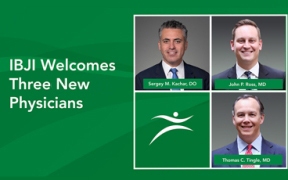This article is part of the the Ultimate Guide to Hip Pain Relief.
There are a variety of treatments that a patient can explore and be recommended to for their hip pain. Throughout your treatment you may find that a hip injection is recommended for your pain. Injections are useful adjuvants to help with symptoms such as hip osteoarthritis.
IBJI recently chatted with Dr. Marc Angerame, board certified orthopedic surgeon with fellowship training in adult reconstruction and hip and knee replacement. Dr. Angerame talks about injections for treating hip pain and how they work. His responses—below—have been edited and condensed for space.
Injections for Treating Hip Pain
Dr. Angerame explains what occurs during a hip injection. “Hip injections involve the use of ultrasound or fluoroscopy, a type of X-ray, to help locate the hip joint for an accurate injection. A small needle will be guided to the hip joint. The most common injection is a steroid injection.”
Dr. Angerame says that most patients can go back to activities the next day, as long as your physician allows it and that many patients will also realize some level of pain relief.
Duration of Relief
How long the injection lasts will vary from patient to patient. It depends largely how long the patient has had pain in their hip and how severe the arthritis is.
“The steroid injection begins to work about three to four days after the injection. It works to decrease inflammation in the hip joint from the arthritis in your hip. Although most patients realize some pain reduction, it is usually not a long-term solution.”
Other injections commonly discussed are hyaluronic acid, platelet-rich plasma (PRP), and stem cell injections. “While hyaluronic acid injections have been approved by the FDA for treating knee osteoarthritis, they have not been approved for the hip. PRP and stem cell injections, while the thought is promising, have not been shown to predictably reduce the symptoms of hip arthritis or regrow cartilage. Further research is needed,” says Dr. Angerame.
While hip injections seem harmless, there are some drawbacks when performed too close to surgery. Dr. Angerame say, “Studies in orthopedic literature have suggested that injection therapy within three months of a total hip replacement increased the risk of infection by nearly 40%1.”
With any treatment, we recommend to have discussions with your hip surgeon to determine the best plan for you. One course of treatment may work better for you than another patient. Your IBJI hip doctor will discuss all of your options and the risks associated with each treatment plan. If you have any questions regarding your treatment, IBJI is here to help. Our hip doctors are happy to answer your questions and concerns.
Get Relief from Your Hip Pain Today
Hip Care and Treatment at IBJI
Whether you are just starting out in your hip care journey or need a second opinion for your hip pain, IBJI’s hip surgeons are here to help provide you with the necessary care for your ailment. Get the relief you are seeking with the help of IBJI.
Schedule online with an IBJI hip surgeon to discuss treatment options and create an individualized approach to your care.
Check out IBJI’s additional online resources for hip care to learn more about conditions and read patient testimonials.
Schedule online with a Hip Doctor →
References:
- American Academy of Orthopaedic Surgeons. "Steroid injections too soon before joint replacement may increase infection risk." ScienceDaily. ScienceDaily, 2 March 2016.
You might also like ...
*This content is for information only and is not intended to replace the diagnosis, treatment, or medical advice from your treating healthcare professionals. The content does not provide medical advice, does not constitute the practice of medicine or other healthcare professional services, and does not create a doctor-patient relationship. You should not rely on this information as a substitute, nor does it replace professional medical advice, diagnosis, or treatment. If you have concerns or questions, seek the advice of your healthcare professionals. If you think you may have a medical emergency, call your doctor or 911 immediately. Do not rely on electronic communications or communicate through this website for immediate, urgent medical needs. This website is not designed to facilitate medical emergencies. The use of the information is at the reader’s own risk. The links are provided for information and convenience only. We cannot accept responsibility for the sites linked or the information found here. A link does not imply an endorsement of a site.





